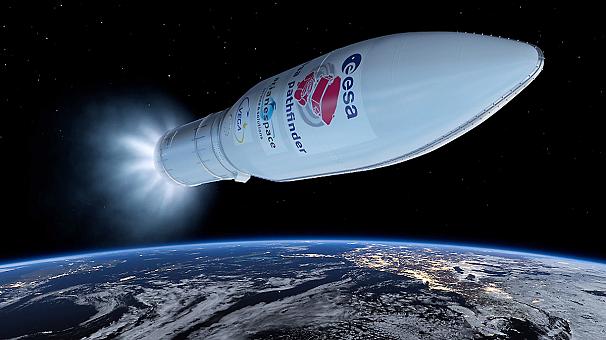In ESA’s words: “Before trying something new, you need to test the technology first, and that is exactly what LISA Pathfinder will be: a technology demonstration mission. It will become the first gravitational laboratory in space for fundamental physics and it will test the technologies that will be needed to detect and measure gravitational waves.”
euronews: “Stefano Vitale, Lisa Pathfinder Principal Investigator, can you explain for us what gravitational waves are, and why they are so important?”
Stefano Vitale, Lisa Pathfinder Principal Investigator: “Gravitational waves are waves of the force of gravity which travel at the speed of light. They are important because we do not see most of the universe, we only see four tenths of one percent of it. We know the universe is full of matter and energy, but we don’t see it. But we do see the dramatic effects of the force of gravity that we don’t see. If we ever manage to listen to the universe, to the changes in the force of gravity, maybe we can at last observe the universe as it really is, which is to say an enormous gravitational system held together by the force of gravity. Therefore, this is an instrument of astronomical research, of very powerful cosmological exploration which will open up a new frontier in astronomy.”
euronews: “Why has it been so hard till now to prove gravitational waves exist, to somehow capture them?”
Vitale: “In reality, we have the proof, because we have seen the emission of gravitational waves, and we have seen them in a system of stars that shed energy while emitting gravitational waves in perfect accord with Einstein’s theory. Only technology allows us, promises us, the instruments capable of observing these minuscule gravitational forces.”
euronews: “By using the two cubes that are an essential part of LISA, can you explain what exactly happens?”
Vitale: “First, I’ll tell you how a gravitational wave detector works. If you put two cubes of this mass into perfect free-fall, with no disturbance, and they are affected by a passing gravitational wave, they accelerate, they vibrate in relation to each other. Naturally, there is a lot of physics involved, because disturbances are very complex physical phenomena. For many years, we have conducted many experiments in terrestrial laboratories, but only this lab that we are putting into interplanetary space and remote-controlling from Earth allows us to achieve the precision necessary to demonstrate that gravitational observation will be feasible.”
euronews: “After this full-scale test phase lasting for six months in space, what will happen?”
Vitale: “LISA comes next. The name of this gravitational observatory is an acronym for Laser Interferometer Space Antenna, but at the same time it is the name of a woman. The mission is called LISA Pathfinder. What the European Space Agency is going to do afterwards is develop the observatory, and that will take several years, because there is so much to do. Once we get it to fly, we will have launched gravitational astronomy in space.”
euronews: “The launch pad is over there, tonight your mission is a ‘go’, how do you feel? Not as a scientist—I’m asking about the human being.”
More about:
















































